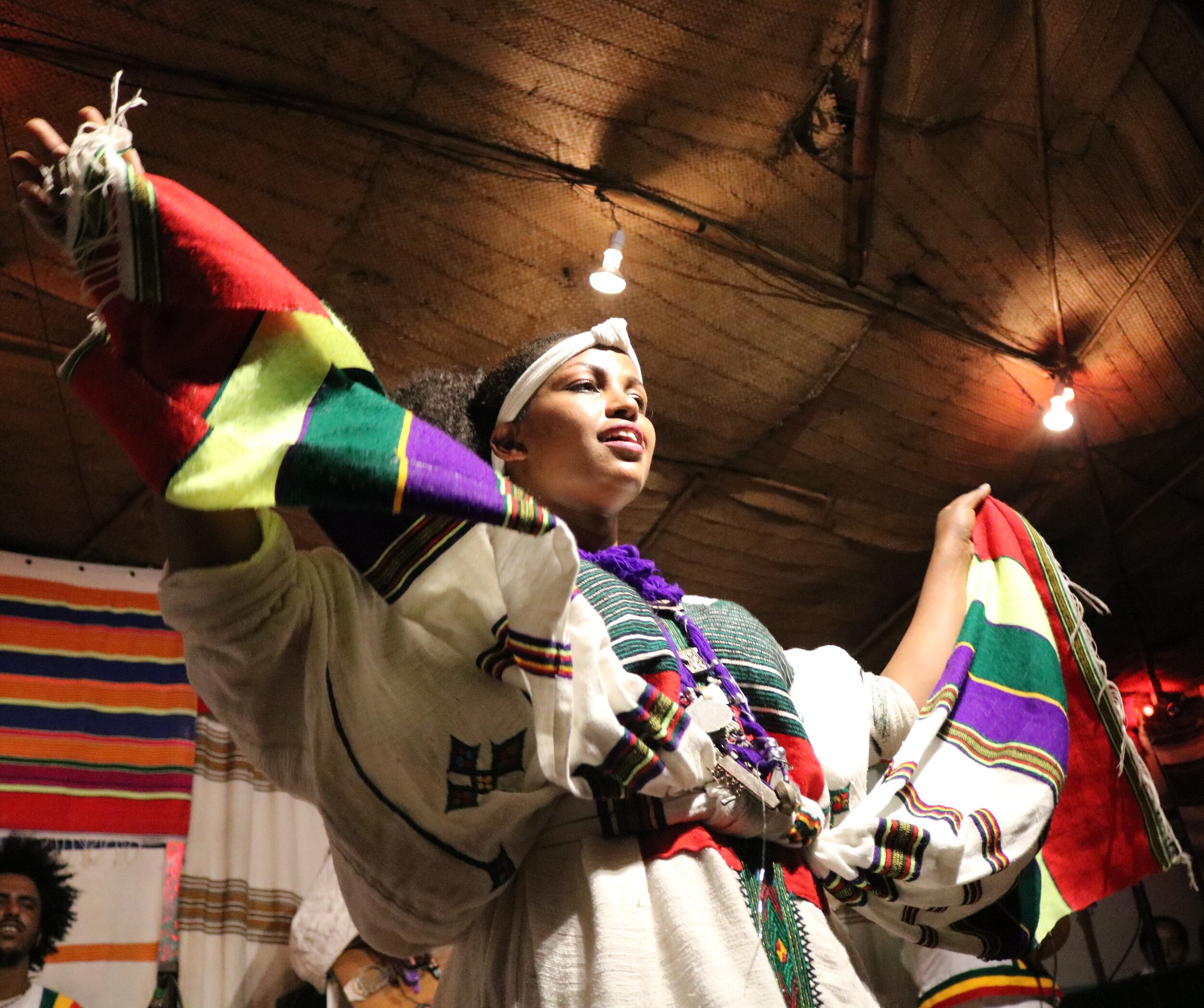Emebet, The Sister Who Made Me Cry with Shiro
Hui Wilcox
May 13, 2020
Emebet Woldetsadik plays many roles for Fendika and its visitors. She is the bright smile that lights up the dim courtyard when you order a drink. She is the steady hand that keeps the paperwork organized and makes sure tips are fairly distributed among the performers. She is the dancer who takes your breath away with her swift Guragegna turns, and crisp Gondar eskista.
But for me, Emu is the sister who can make me smile and cry at the same time, simply by looking at me. She drew me in with her eyes, and her stories that I did not yet know.
I arrived in Fendika a little hungry, in the middle of the night, after a long international flight. Emu brought a hot bowl of shiro with injera, and coaxed me into eating up every drop of the shiro and every morsel of the injera. When my late-night dinner was finished (I mean FINISHED!), to Emu’s satisfaction, my tears came, from the thought that I would have to say good-bye to this person and this place in two weeks. I just arrived, and Emu already made me miss her, Fendika, and Addis Ababa.
Emu was dancing every night at Fendika, and working behind the counter as well. She had a cough that lasted the entire two weeks I was there. When I saw her during the day, she was sweeping the courtyard, or making bunna - always busy. Between all of her duties, she managed to teach me a couple of dance lessons. She had an eye for details and patiently corrected my mistakes: the foot in front should be turned in, for Guragegna; the outward push should be from the sternum, not from the shoulders, for Oromegna.
I asked her where she learned dance. She said here, in Fendika. “Did you go to dance schools?” “A little.” She said. Many months later, in a formal interview, she told me she started learning dance when Melaku was giving dancing lessons in Fendika around 2011 and 2012. Those lessons got her interested in dance. Later she started training at the National Theater, through a 3-month program that she completed twice. During those days, she worked in Fendika until 3 am, and got up at 6 am to train at the National Theater, until late afternoon. After the end of the second 3-month program, she was selected to participate in a 15-day intensive training program, 7 am – 7 pm daily. But when the theater offered her the opportunity to perform in the evening, she quit because she did not want to leave her work at Fendika.
It was not a difficult decision for her, because Fendika is her home and her family. She loves everything she does here. She loves everybody here, from Melaku who has mentored her for 10 years, to the audiences who come from all over the world. “They all have something to teach me. And they are all so kind.” she said. But she does not love indiscriminately; she is a young woman who learns by observation. “When I first came to Fendika, Melaku was out of the country. Even after he returned, I didn’t know he was the boss. I saw his picture on the wall and thought maybe it was someone who had died. I didn’t think he was the boss because he was dancing every day, like the other dancers.” “I didn’t like him at first because he had big hair and he had the same black jacket on all the time.”
Eventually Emu realized that Melaku was “the boss,” after all. And she started liking him, too, exactly because he didn’t fit her idea of a boss. “He didn’t get angry with me when I made mistakes. I wasn’t scared of him. I feel free at Fendika.” Emu started as a cashier at Fendika, though she did not know anything about being a cashier. She needed a job desperately, and Fendika got one for her. She learned fast, with help from Azeb and Mesay. But discovering and developing her dance talent have given her the most joy.
Her family, however, has yet to accept her work at Fendika and as a dancer, even though she supports her family with her income. When she appeared on TV dancing in the National Theater or abroad with Fendika, her parents would call her to tell her “We saw you on TV!” But they have never visited her at Fendika, which makes her sad. “I love my parents. I want to make them happy and proud.” That involves following the traditional pathway of Ethiopian womanhood. Tinged with a sadness about her parents’ opinions, Emu’s bright eyes remain set on dreams of performing Ethiopian dance around the world. “I want to be Emebet.” A dancer with her unique style.
Emu already has her style. I don’t think you’ll disagree with me. Emu is young; but she has lived enough life to be wise and kind beyond her age. How Emebet got to Fendika, is a story written somewhere else. I look forward to writing about her future adventures, where she teaches the world about the beauty and wisdom of Ethiopian dance.

